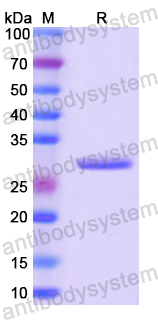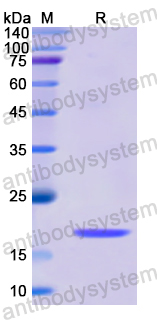Catalog No.
YHE01101
Expression system
E. coli
Species
Homo sapiens (Human)
Protein length
Thr84-Met335
Predicted molecular weight
30.79 kDa
Nature
Recombinant
Endotoxin level
Please contact with the lab for this information.
Purity
>90% as determined by SDS-PAGE.
Accession
P32780
Applications
ELISA, Immunogen, SDS-PAGE, WB, Bioactivity testing in progress
Form
Lyophilized
Storage buffer
Lyophilized from a solution in PBS pH 7.4, 0.02% NLS, 1mM EDTA, 4% Trehalose, 1% Mannitol.
Reconstitution
Reconstitute in sterile water for a stock solution. A copy of datasheet will be provided with the products, please refer to it for details.
Shipping
In general, proteins are provided as lyophilized powder/frozen liquid. They are shipped out with dry ice/blue ice unless customers require otherwise.
Stability and Storage
Use a manual defrost freezer and avoid repeated freeze thaw cycles. Store at 2 to 8°C for frequent use. Store at -20 to -80°C for twelve months from the date of receipt.
Alternative Names
GTF2H1, General transcription factor IIH subunit 1, BTF2, Basic transcription factor 2 62 kDa subunit, BTF2 p62, TFIIH basal transcription factor complex p62 subunit, General transcription factor IIH polypeptide 1
Systematic identification of pathogenic variants of non-small cell lung cancer in the promoters of DNA-damage repair genes., PMID:39631147
Augmenter of liver regeneration inhibits renal fibrosis during acute kidney injury to chronic kidney disease transition by regulating autophagic flux., PMID:39613286
CHIP ameliorates nonalcoholic fatty liver disease via promoting K63- and K27-linked STX17 ubiquitination to facilitate autophagosome-lysosome fusion., PMID:39353976
A comprehensive identification of potential molecular targets and small drugs candidate for melanoma cancer using bioinformatics and network-based screening approach., PMID:37534476
Key Risk Genes Identified From the Postmortem Brain of Patients With Major Depressive Disorder and Their Potential Clinical Applications., PMID:37235790
Identification of two unannotated miRNAs in classic Hodgkin lymphoma cell lines., PMID:36961799
Impact of GTF2H1 and RAD54L2 polymorphisms on the risk of lung cancer in the Chinese Han population., PMID:36384536
The Mechanism of TNF-α-Mediated Accumulation of Phosphorylated Tau Protein and Its Modulation by Propofol in Primary Mouse Hippocampal Neurons: Role of Mitophagy, NLRP3, and p62/Keap1/Nrf2 Pathway., PMID:35993019
GDF-15 Deficiency Reduces Autophagic Activity in Human Macrophages In Vitro and Decreases p62-Accumulation in Atherosclerotic Lesions in Mice., PMID:34571994
Oxidative stress induced by realgar in neurons: p38 MAPK and ERK1/2 perturb autophagy and induce the p62-Keap1-Nrf2 feedback loop to activate the Nrf2 signalling pathway., PMID:34492322
Curcumin activates Nrf2 through PKCδ-mediated p62 phosphorylation at Ser351., PMID:33875681
Identification of DNA repair-related genes predicting pathogenesis and prognosis for liver cancer., PMID:33516217
Structural and dynamical insights into the PH domain of p62 in human TFIIH., PMID:33211877
The plasma peptides of sepsis., PMID:32636717
TMEM16A ameliorates vascular remodeling by suppressing autophagy via inhibiting Bcl-2-p62 complex formation., PMID:32226533
Phenylbutyrate facilitates homeostasis of non-resolving inflammatory macrophages., PMID:31604378
Highlighted role of VEGFA in follow up of celiac disease., PMID:31528310
Poly-ubiquitinated p62/SQSTM1-mediated hemeoxygenase-1 stabilization plays a critical role in cadmium-induced apoptosis of mouse monocyte Raw264.7 cells., PMID:31521246
p62/mTOR/LXRα pathway inhibits cholesterol efflux mediated by ABCA1 and ABCG1 during autophagy blockage., PMID:31101336
Uncoupling Protein 2 Drives Myocardial Dysfunction in Murine Models of Septic Shock., PMID:31080837
The Ameliorating Effect of Plasma Protein from Tachypleus tridentatus on Cyclophosphamide-Induced Acute Kidney Injury in Mice., PMID:30991714
Nrf2 signaling and autophagy are complementary in protecting lipopolysaccharide/d-galactosamine-induced acute liver injury by licochalcone A., PMID:30952839
Cathepsin L-deficiency enhances liver regeneration after partial hepatectomy., PMID:30797017
Deficiency of apoptosis-stimulating protein two of p53 ameliorates acute kidney injury induced by ischemia reperfusion in mice through upregulation of autophagy., PMID:30675758
Lineage-specific control of TFIIH by MITF determines transcriptional homeostasis and DNA repair., PMID:30651597
DNA damage sensitivity of SWI/SNF-deficient cells depends on TFIIH subunit p62/GTF2H1., PMID:30287812
Exogenous H2S Inhibits Autophagy in Unilateral Ureteral Obstruction Mouse Renal Tubule Cells by Regulating the ROS-AMPK Signaling Pathway., PMID:30257249
Heat Shock Protein B8 (HSPB8) Reduces Oxygen-Glucose Deprivation/Reperfusion Injury via the Induction of Mitophagy., PMID:30071537
ROS Generated by Upconversion Nanoparticle-Mediated Photodynamic Therapy Induces Autophagy Via PI3K/AKT/ mTOR Signaling Pathway in M1 Peritoneal Macrophage., PMID:30071509
Resveratrol attenuates denervation-induced muscle atrophy due to the blockade of atrogin-1 and p62 accumulation., PMID:29725254
p62 - a new metabolic tumour suppressor., PMID:29692410
Loss of autophagy in dopaminergic neurons causes Lewy pathology and motor dysfunction in aged mice., PMID:29434298
Necrostatin-1 attenuates sepsis-associated acute kidney injury by promoting autophagosome elimination in renal tubular epithelial cells., PMID:29257238
Dihydromyricetin modulates p62 and autophagy crosstalk with the Keap-1/Nrf2 pathway to alleviate ethanol-induced hepatic injury., PMID:28419832
Elimination of paternal mitochondria in mouse embryos occurs through autophagic degradation dependent on PARKIN and MUL1., PMID:27852436
Cardiac-Specific Overexpression of miR-222 Induces Heart Failure and Inhibits Autophagy in Mice., PMID:27614440
Autophagic flux regulates microglial phenotype according to the time of oxygen-glucose deprivation/reperfusion., PMID:27474951
Effects of Exogenous NUB1 Expression in the Striatum of HDQ175/Q7 Mice., PMID:27314618
CARD9 knockout ameliorates myocardial dysfunction associated with high fat diet-induced obesity., PMID:26900039
Leucine restores murine hepatic triglyceride accumulation induced by a low-protein diet by suppressing autophagy and excessive endoplasmic reticulum stress., PMID:26707165
β-asarone and levodopa co-administration protects against 6-hydroxydopamine-induced damage in parkinsonian rat mesencephalon by regulating autophagy: down-expression Beclin-1 and light chain 3B and up-expression P62., PMID:25424835
The adaptor protein p62 is involved in RANKL-induced autophagy and osteoclastogenesis., PMID:25163928
[Mycelium of Hirsutella hepiali Chen et Shen activates autophagy and protects against metabolic syndrome in mice fed with high fat diet]., PMID:25151730
Assessment of chloroquine treatment for modulating autophagy flux in brain of WT and HD mice., PMID:25062859
Preconditioning stimuli induce autophagy via sphingosine kinase 2 in mouse cortical neurons., PMID:24928515
Defective regulation of the ubiquitin/proteasome system in the hypothalamus of obese male mice., PMID:24892821
Sensitivity and specificity of in situ proximity ligation for protein interaction analysis in a model of steatohepatitis with Mallory-Denk bodies., PMID:24798445
Coffee induces autophagy in vivo., PMID:24769862
MicroRNA-mRNA functional pairs for cisplatin resistance in ovarian cancer cells., PMID:24589211
TLR4 mediates the impairment of ubiquitin-proteasome and autophagy-lysosome pathways induced by ethanol treatment in brain., PMID:24556681


